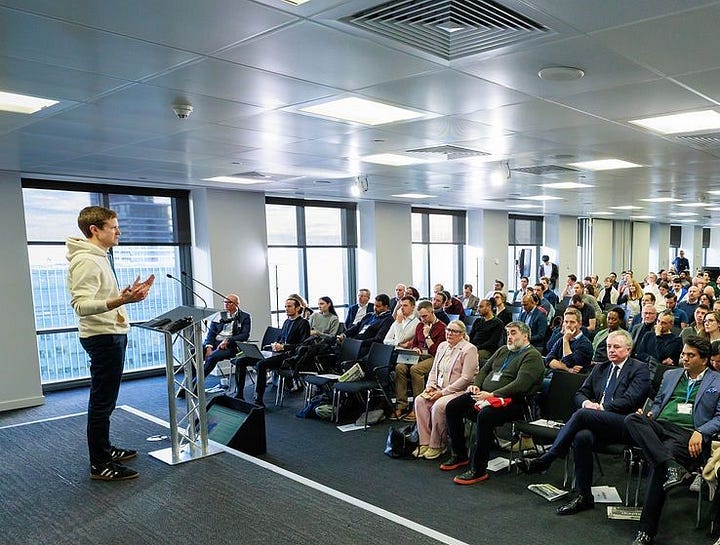Fixing clinical trials, with Lord James O'Shaughnessy
Welcome back to The Form Playbook, supporting founders building the future of regulated markets.
This month:
🎙️Interview with Lord James O’Shaugnessy, a former Health Minister, about fixing clinical trials and the MHRA to support innovation
⏰ Form Updates: We launched our FixTheRegulators campaign to help startups move quickly in regulate markets, Patrick spoke at Pitchflix’s reverse pitch event, and Leo joined the BVCA’s Emerging Managers Forum
Lord James O’Shaughnessy, former Health Minister, on fixing clinical trials
James O’Shaughnessy is a former UK Health Minister focused on Life Sciences and Innovation, as well as former Director of the No.10 Policy Unit. Last year, after clinical trial activity had dropped significantly in the UK, he led a review into the future of commercial studies with a focus on fixing the backlog in trial applications, improving data and accountability on trial activity, and improving incentives for research activity throughout the NHS. It has already had an enormous impact so we caught up to hear more about the impact on startups and life science innovation across the UK — an area we know well via Stitch Health, which helps trial sponsors to understand and improve patient experience during studies.
James’s insight on the future of UK clinical trials:
Fixing the drop in UK clinical trials activity was hugely important: there are direct health benefits for patients, fiscal benefits if sponsors are covering patients’ cost of care, and economic benefits from enabling more life sciences investment in the UK. But after years of structural decline, particularly with Covid diverting attention towards vaccine and covid therapeutic trials at the expense of almost everything else, commercial trial activity dropped massively post-pandemic.
The priority for the Review was to get the MHRA sorted out in order to clear the backlog of clinical trial applications. Performance of the regulator was more than 50% of the problem. Funding cuts and broken processes led to some applications not being tackled even within 12 months. Only after £10m extra funding and protocol amendments is the regulator now back on track with 60 day turnarounds for applications.
Trial set-up has also become painful at site level. There is friction throughout: duplication of due diligence requirements, lack of real-time data, ambiguity around consent to contact patients, while infrastructure and resourcing is often designed around regions, not patients. The Review also set out to solve these issues, including funding for new Clinical Trial Delivery Accelerators to adopt a more patient-centric approach to study design.
The future of life sciences is changing rapidly. As AI, software & computation redesign both drug discovery and patient experiences, new regulatory pathways are required for personalised therapeutics where generating broad-based clinical evidence isn’t possible. There’s also a huge opportunity to combine real-time data, reforms to patient contact, and massive simplification and automation of clinical trial processes to improve supply and match to patient demand.
Find the full interview transcript at the bottom of this email.
Form Updates:
“The biggest rate limiter on UK tech is no longer capital or talent. It’s not even regulation. It’s regulators.”
In February, we launched our FixTheRegulators campaign alongside Lord Dominic Johnson, the Minister for Investment and Regulatory Reform. Our launch report highlights how backlogs and delays across the UK’s regulators are needlessly holding back startups across nearly every major sector, and prompted the Financial Times to publish a dedicated deep dive on the issue. Thanks again to POLITICO, UKTN and our friends at The Entrepreneurs Network for their coverage too, to Finn Stevenson (Flok Health), Ed Steele (Hoxton Farms) and Sarah Gates (Wayve) for joining us, and for Atomico for kindly hosting us all. If you’re a founder, investor, or policymaking working on scaling tech in regulated markets: get in touch.
We also closed 2 new deals, investing in brilliant teams building in cross-border trade and payments 👀
Finally, Patrick was grilled by founders at Pitchflix’s reverse pitch event, while Leo also joined the BVCA’s Emerging Manager Forum


Full Interview with Lord James O’Shaughnessy:
FORM: James, you’ve had a long and varied policy career, ranging from Director of Policy at No10 to becoming a member of the House of Lords as well as health minister. Your latest policy contribution is via a clinical trials review you carried out for the Government last year - what prompted it? What are your hopes for the review?
LORD JAMES O’SHAUGHNESSY: Over a period of years there was less attention given to this area: clinical trials is not a first-order health policy issue compared to elective waiting lists, GP funding, or the NHS workforce. But it’s a really important second order issue and a bit of a canary in the coal mine about the health of the life science ecosystem. So it does require sustained attention over time. And if you have a lot of churn in officials and government ministers, or you have agencies like the MHRA which have been cut or have their attentions elsewhere, then burgeoning problems can snowball over time. And then that really came to a head in the post-pandemic period when commercial clinical trial activity dropped. So Covid was a mixed blessing: we did a brilliant job with the vaccine trials, but at the cost of putting everything else on hold. Our recovery was hard, and that fed into the structural decline.
But improving clinical trial activity really matters for a few reasons. The first is that it’s an opportunity for tens of thousands of patients to get early access to effective medicines — most commercially sponsored trials are Phase 2b or 3 trials and you know the drug works at that point, it’s really just about effect size and gathering data for regulatory and reimbursement authority submissions. The second is that there’s a financial cost to the NHS of covering care for people who would otherwise be on trials: that’s hundreds of millions that’s got to be found by the taxpayer and the Treasury during a difficult fiscal situation. The third is that when life sciences companies think about investing in a country like the UK, the ability to run clinical trials is an important factor. If that’s dysfunctional, it’s another reason not to be here. So there’s a direct health impact, a financial impact, and a wider economic impact.
One issue we’ve seen across a range of sectors is that sectoral regulators are struggling to support innovation, due to lack of resource, restrictive rules, or simply their risk appetite. How important is regulatory capacity and speed — not just specific rules — to enabling life science innovation, and where do you think we are as of today with the UK health and life sciences regulators?
The most important thing with the review was to get the MHRA sorted out. It got to a point where you would send something in and literally not get a reply for a year. It was really bad. So government put a bit more money in, and they’ve actually now cleared their backlog of clinical trial applications and I think there’ll be protocol amendments as well. Now they’re back on track with 60 Day turnarounds, and they’re looking at how to reduce that to a 14 day turnaround for low risk trials. I would say that performance of the regulator was more than 50% of the problem.
What else did you focus on in the review? How might different types of companies benefit from the recommendations, e.g. startups as well as larger pharma / life science companies?
The top-down problem was the regulator. But the bottom up problem is just how painful it is to set up a trial, particularly if you’ve not had good infrastructure investment. So that led to a few other priorities.
We focused on national contracting and costing because part of the issue is the duplication of due diligence setting up trials, which is completely infuriating and ridiculous. So NHS England now has a target for 100% of trials to be nationally contracted, but it’s an open question as to whether that will be enough.
Another major focus was around data, and we should have a real-time dashboard for clinical trial activity coming into operation by April 2025 — but I’m hoping they can publish a beta before then. And it will show that commercial clinical trial activity has doubled in recent months — proving that this is one of those issues that, if you pay attention to it, you can get it going.
Then we had to dig into the ‘consent to contact’ problem and the ambiguity about what you can do. So the HRA should be coming up very soon with guidance on how to do that, which will hopefully cut through a lot of what’s out there.
Then finally, we wanted to include a vision of how to do things differently. Most clinical trial infrastructure and resourcing is done on a regional basis. But as a patient the most important thing is your disease, and if you’re a sponsor the most important thing is that you recruit with the disease you’re working on — not where they live. So there’s a disjunction in the way that we fund research. So we proposed and funded new clinical trial acceleration networks (CTANs), which are disease-based platforms for priority areas like cancer, vaccines and dementia focused around the patient.
In government, there are reviews designed to solve problems quickly and reviews designed to delay solutions indefinitely. This was definitely the former. What worked well to enable such rapid progress?
I was very conscious that this work wouldn’t really land unless I could persuade people in the NHS that it matters and persuade people in the Treasury that it matters. And I think we made that argument. We were then able to do the programme pretty quickly: when you’re not a Minister, you can just tell things how they are and the problem statement/solution structure was well received. Then one peculiarity is that we were finished by the end of April 2023, but then it was the local election campaign and you can’t launch any new policies during the purdah campaign. So that delayed it, but effectively gave me a month to line up Treasury and Number 10 — to get them on board and to put money behind it. So you got an initial response in May, followed by a promise to come back within six months with a more fulsome response, which is what you saw in November. Being honest, it helps to have my background, it helps that the former Health Secretary is now Chancellor, it helps that the Office for Life Sciences could be another group banging the drum for better clinical trial activity, improved access to data, better regulation, access to finance, and improved drug pricing.
Life sciences is changing rapidly. AI, computation & software are redesigning trial design, drug discovery, and patient experience and retention, e.g. Stitch Health. Even new regulatory pathways are being developed for personalised therapeutics where generating broad-based clinical evidence isn’t possible. What are you most excited for on the technology side, and how do you think wider policy, beyond trials, might need to adapt to accelerate benefits for patients and clinicians?
Personalised medicines and gene therapies are absolutely there. But I’d also go right to the other end and seeing this from the point of view of patients, to how we can use technology to address the barriers to citizens being part of more health research. The essential nature of research to the delivery of better health care is not well understood. Which is why I wanted to get into the ‘consent to contact’ issue and build the real time database of clinical trials is exactly around this: I shouldn’t have to rely on family or friends to find out what might work for me. Then if you can combine that with massive simplification and automation of clinical trial processes and delivery, you ought to be able to improve supply to meet demand with all the potential direct health, financial and economic benefits we’ve discussed. But I’ve not yet seen anything in that space!
As always, if you’re building in the future of regulated markets, get in touch.



